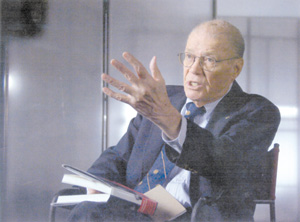
The Fog of War: Eleven Lessons From the Life of Robert S. McNamara
2003, PG-13, 106 min. Directed by Errol Morris.
REVIEWED By Marjorie Baumgarten, Fri., Feb. 27, 2004
Errol Morris is one of our country’s finest filmmakers. He makes documentaries that unfold like personal essays, his curiosity about the inevitably contradictory nature of his chosen subject matter driving each movie rather than any self-imposed need for exposition, conclusions, or certitude. Though his subject matter often seems eccentric – blind mole rats, a death row doctor and Holocaust denier, paralyzed physicist Stephen Hawking, the pet cemetery business, a topiary gardener – the things about these subjects that interest him are their internal contradictions and intrinsic oppositions. It’s as if he were trying to find a center that he knows cannot hold but somehow, against all logic, does. Given all this, Robert S. McNamara, the former secretary of defense under Presidents John Kennedy and Lyndon Johnson, may prove to be Morris’ ultimate interview "get." Morris, like others who came of age in the Sixties during the years of the American involvement in the war in Vietnam, probably still harbors a deep and abiding anger for McNamara, who is often described as the "architect" of the American policy in Vietnam. Recruited by Kennedy to join his Cabinet at the start of his administration, McNamara is a perfect example of what was meant by the phrase "the best and the brightest." He left his post as the first non-Ford-family president of Ford Motor and served as secretary of defense from 1961 to 1968. He was an Oval Office adviser during the Bay of Pigs and the Cuban Missile Crisis, but as the war in Vietnam ramped up during the Johnson administration, McNamara grew increasingly convinced that the war was unwinnable. As Morris’ film shows, McNamara shared his conclusions with the president, and then in 1968 he either quit or was fired (he claims not to know which) as the secretary of defense and never spoke a word of public disagreement with the conduct of the war. And that, in a nutshell, is the source of the anger many still hold toward McNamara: He is the ultimate company man who toed the line and walked the walk when his public dissent might have been a more courageous – and certainly influential – course of action. Even to this day with the benefit of hindsight, the octogenarian refuses to accept any culpability for his actions. His world-view can be understood through the 11 lessons Morris has fashioned from the lengthy one-on-one interviews he conducted with McNamara for this film. McNamara is a pragmatist, whose deportment in front of the camera is articulate, persuasive, assured, and commanding. He describes how the Cuban Missile Crisis was resolved through luck not diplomacy (Lesson No. 2: Rationality will not save us). He talks about his WWII association with Gen. Curtis LeMay, a leading "bomb ’em back to the Stone Age" hawk, who led the devastating fire bombings of Tokyo months before the atomic bomb was dropped, based on statistical studies by McNamara that determined the inefficiency of pinpoint bombing (Lesson No. 5: Proportionality should be a guideline in war; Lesson No. 6: Get the data). McNamara emerges as an ever more fascinating figure – wise but exasperating. His life provides rich study for those who have lived during the same conflicts as he, as well as for younger newcomers hungry for resources to help us understand our nation’s history. Lessons like "Empathize with your enemy" (No. 1) hold rich implications for our current "stuck inside of Baghdad with the Saigon blues again" times. Morris’ plentiful and creative use of extensive amounts of archival footage helps expand the movie beyond mere biopic, and the score by composer Philip Glass more than delivers the desired mood, which Morris describes as "existential dread." In the end, The Fog of War offers a couple of hours of brilliant clarity amid the noise and chaos. (For interviews with Errol Morris and Philip Glass, see austinchronicle.com/issues/dispatch/2004-02-20/screens_feature.html.)
A note to readers: Bold and uncensored, The Austin Chronicle has been Austin’s independent news source for over 40 years, expressing the community’s political and environmental concerns and supporting its active cultural scene. Now more than ever, we need your support to continue supplying Austin with independent, free press. If real news is important to you, please consider making a donation of $5, $10 or whatever you can afford, to help keep our journalism on stands.
Kimberley Jones, Sept. 9, 2013
Marjorie Baumgarten, July 21, 2017
The Fog of War: Eleven Lessons From the Life of Robert S. McNamara, Errol Morris










